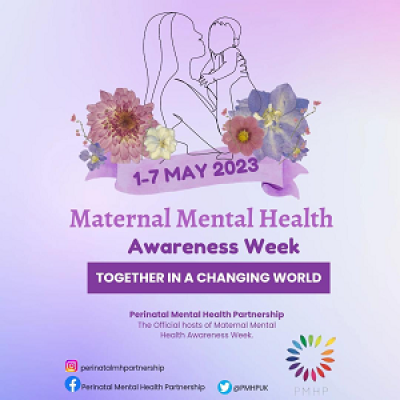Around 1 in 5 women experience a mental health issue during pregnancy or within the early postnatal years.
Organised by the Perinatal Mental Health Partnership UK, Maternal Mental Health Week aims to encourage people to access the information and help they require to enable recovery.
John Denley, Wolverhampton's Director of Public Health, said: "Being pregnant or a new mum is a major event in life, and it is natural for people to feel a lot of different emotions – and sadly 1 in 5 women will experience mental health issues at this time. It can also be a tough time for fathers too.
"But if you’re feeling sad and it’s starting to affect your life, there are lots of things you can do that may help, so please don't suffer in silence."
There are a range of techniques people can employ to keep themselves well before, during and after pregnancy:
- Talking to a close family member or friend as well as a health professional can really help. If sharing your thoughts is difficult, you might find it helpful to write your feelings down before you talk about them together. Also, talk to your GP, who will help put a treatment plan in place that will enable you to get better.
- Relaxation techniques can help you look after your wellbeing when you’re feeling stressed, anxious or busy, and reduce stress and anxiety too. Get tips about mindfulness.
- Prioritising sleep can give you the energy to cope with difficult feelings and experiences. So, make sure you try to get to bed at a reasonable time and switch off electronic devices an hour before bed to unwind.
- Eat healthily – think about your diet and make sure you’re getting enough of the good stuff, and your 5 a day. Eating regularly and keeping your blood sugar stable can make a difference to your mood and energy levels.
- Exercise can be helpful for your mental wellbeing. Even a short walk can do wonders to help clear your mind after a busy or stressful day. Find out about pregnancy workouts on the NCT website.
- Create a wellbeing plan to prepare the support you might need to look after your mental wellbeing. While coping with the physical changes in pregnancy, birth and beyond, your emotional wellbeing is important too.
- Peer support brings together people who’ve had similar experiences to support each other and has many benefits, like feeling accepted for who you are, helping you feel less isolated and giving you a safe, non judgmental space to talk.
- Find what works for you; if something isn’t working for you, then it’s ok to go back and discuss your feelings and treatment options with your GP.
Anyone with concerns about their mental health and wellbeing should contact the Black Country Healthcare NHS Foundation Trust's 24 hour helpline on 0800 008 6516 or text 07860 025281.
For more information on good mental health during pregnancy, visit the NHS website.
To find out more about Maternal Mental Health Awareness Week, please visit Maternal Mental Health Alliance.
